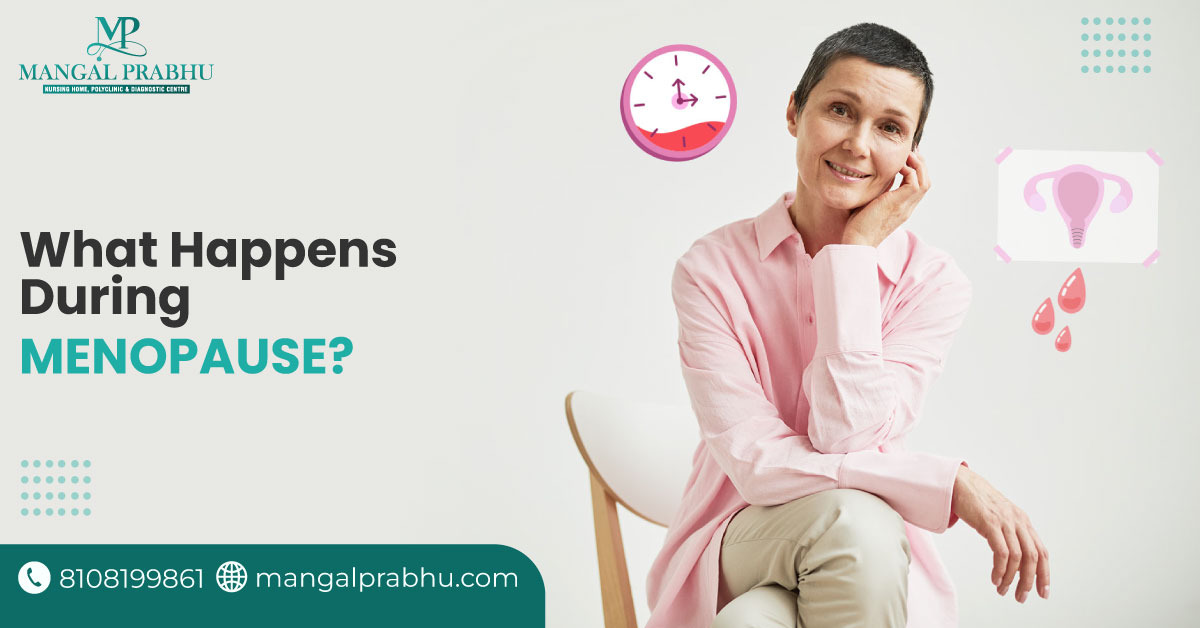
What is Menopause?
Menopause marks the end of your menstrual period or the reproductive age. A woman can’t get pregnant after menopause. It happens when you have not had your period for 12 months in a row. There’s no fixed age for menopause, although most women tend to experience it between 45 and 51. It’s a natural aging process. However, the symptoms of menopause, especially during the perimenopause period, can take a toll on your physical and emotional health. It’s important to see a gynecologist in Navi Mumbai if you experience hot flashes, excess bleeding, pelvic pain, and other symptoms.
Common Symptoms of Menopause
Perimenopause is a period where a woman’s body prepares to enter menopause. During this phase, you might experience many physical and emotional symptoms, including:
- Hot flashes
- Sudden urge to urinate
- Inability to hold pee
- Vaginal dryness
- Difficulty sleeping
- Chills
- Weight gain
- Irregular periods
- Heavy bleeding
- Sudden shifts in mood
- Hair thinning
Symptoms can vary for each woman, although irregular periods are quite common in all.
Treatment Options for Menopause
Menopause doesn’t need treatment, but you can consider hormonal therapies and medication to get relief from the symptoms disrupting your life.
i) Hormone Therapy:
The amount of estrogen and progesterone (the two vital reproductive hormones in women) is reduced significantly as you enter menopause. This might cause vaginal dryness and hot flashes. Hormone therapy can restore and balance the levels of these hormones and alleviate the symptoms.
ii) Prescription Medication:
Non-hormonal medications for hot flashes, vaginal dryness, and mood swings can help manage your perimenopause symptoms.
Also Read: What to Expect Before and After Ovarian Cyst Surgery?
Lifestyle Changes to Help Manage Menopause
Menopause treatment in Navi Mumbai is needed if your lifestyle and dietary changes do not produce any results. Here’s what you can try in the meantime.
a) Diet:
Limit caffeine intake and avoid spicy food to manage hot flashes. You should add vitamin-rich foods to your diet to get the required nutrients. Add lentils, chickpeas, grains, soybeans, vegetables, and fruits to your diet.
b) Exercise:
Meditation and Yoga can help you with mental and physical issues with menopause. Regular exercising improves your sleep and reduces anxiety related to menopause.
c) Avoid Triggers:
Certain activities might trigger your symptoms and make them worse. For instance, your weight or smoking habits can worsen your hot flashes. Identify these triggers to manage your symptoms.
Potential Complications and Risks of Menopause
The risk of certain medical issues increases after menopause. You should watch out for the following:
A) Heart Diseases:
A sudden drop in estrogen levels in your body puts you at an increased risk of cardiovascular diseases. Check your cholesterol levels and blood pressure regularly to prevent any heart-related complications.
B) Urinary Incontinence:
You might experience a sudden urge to pee and the inability to hold it. Women after menopause might also experience urine leaks when coughing, sneezing, laughing, etc. Any physical jerk can lead to urge incontinence.
C) Osteoporosis:
Postmenopausal women are at a higher risk of fractures of the hip and knee joints, as their bones become weak.
Lastly, you might experience some discomfort during sexual intercourse because of the vaginal dryness. Speak with your doctor if you experience any of these post-menopausal complications.

